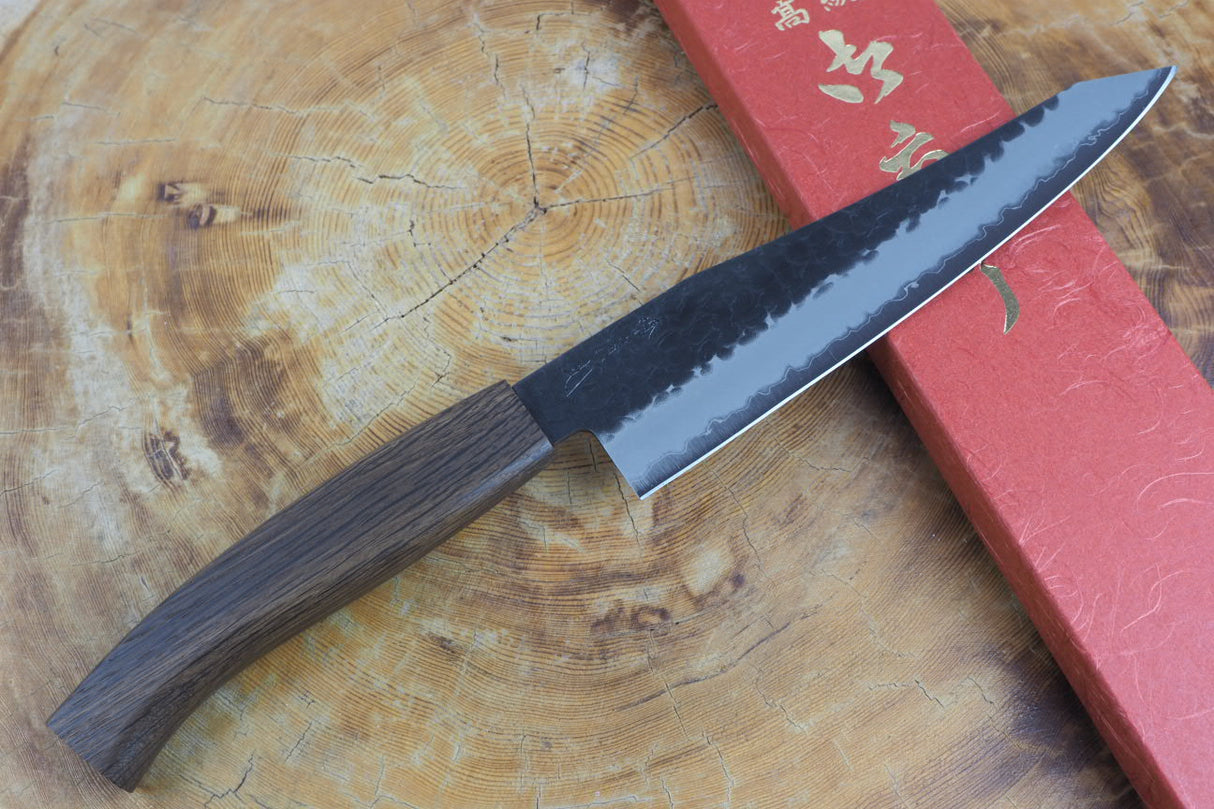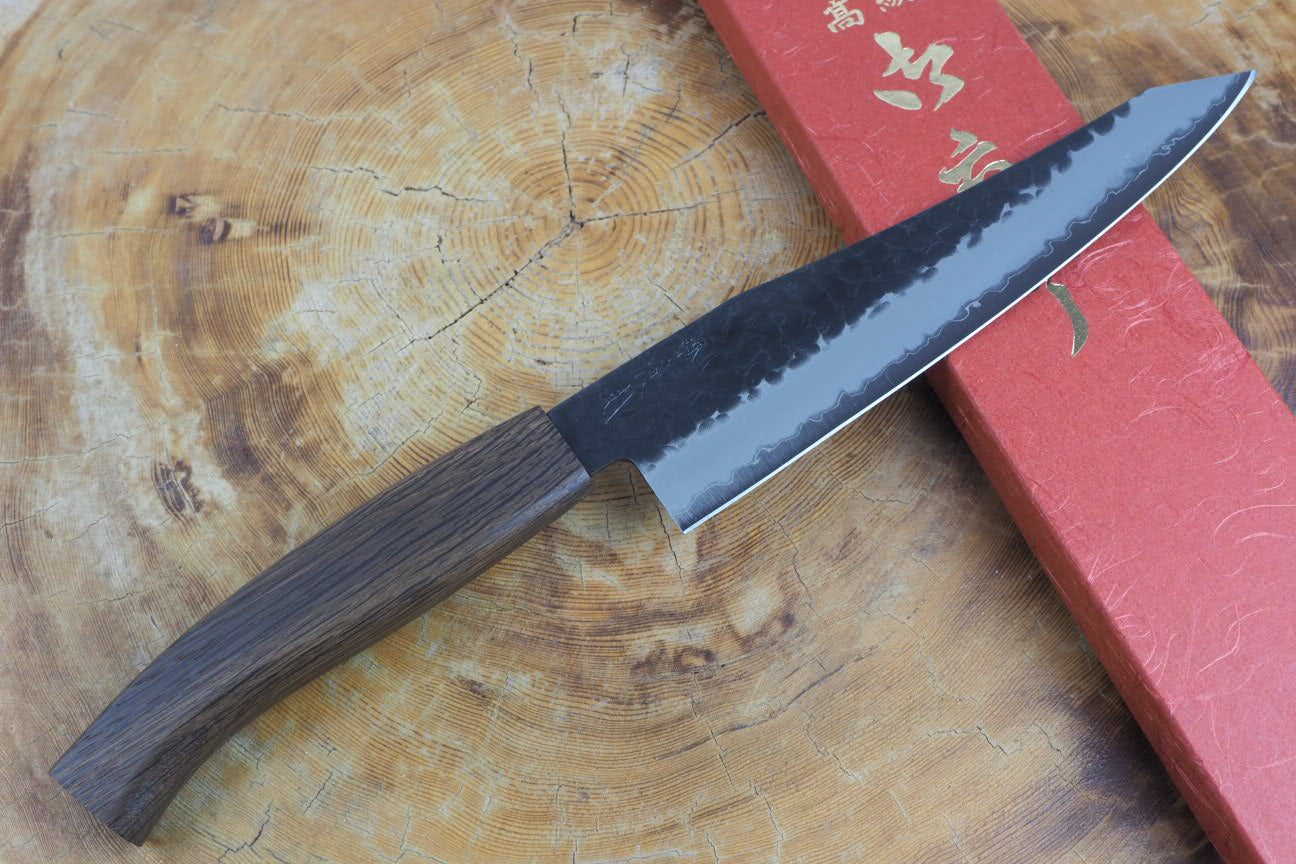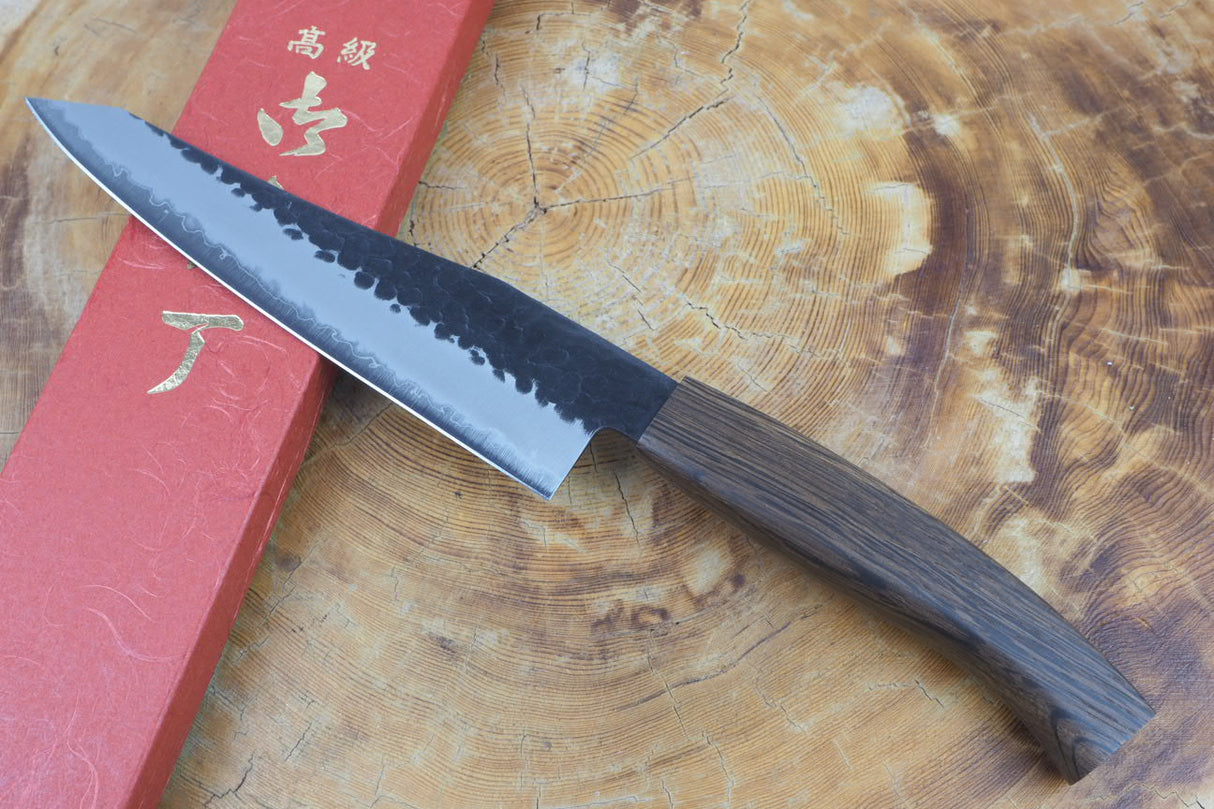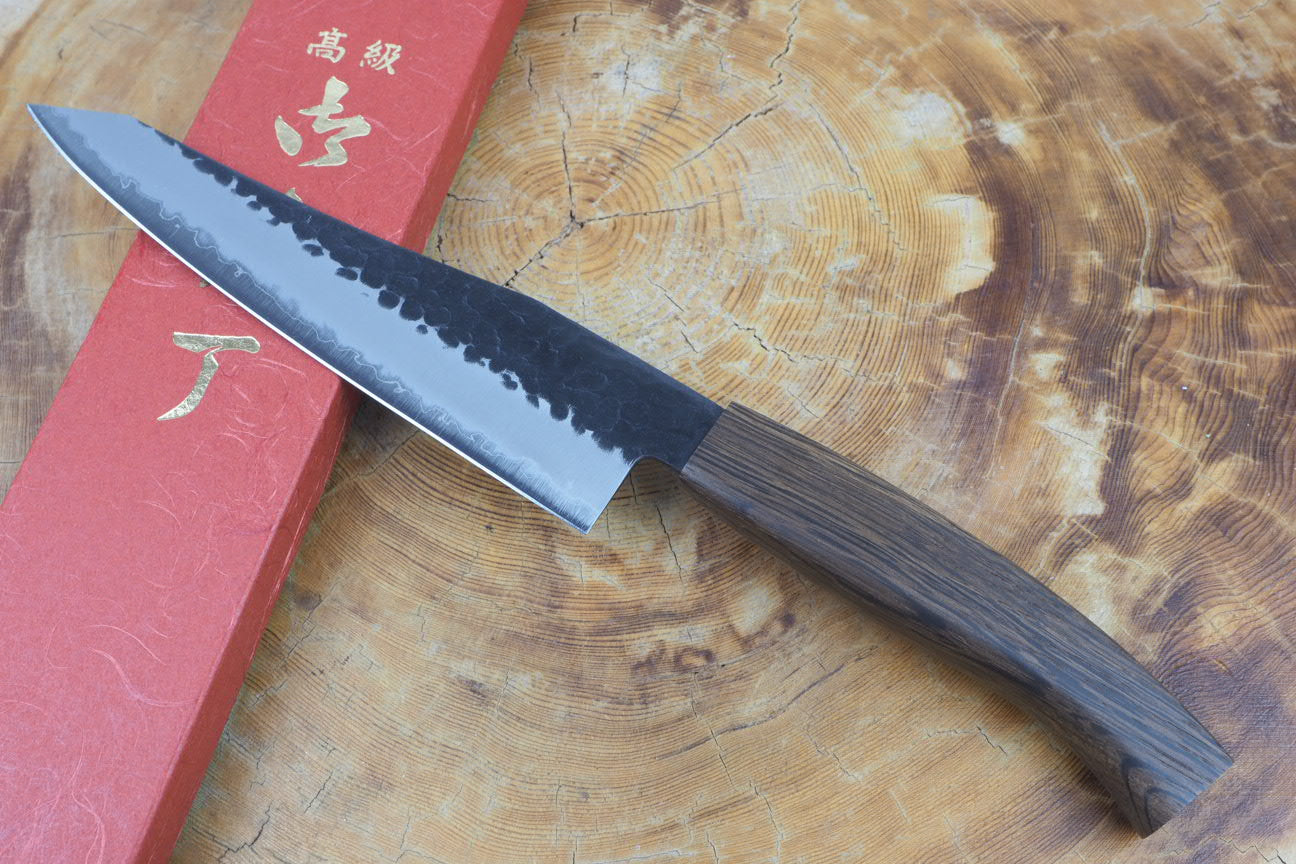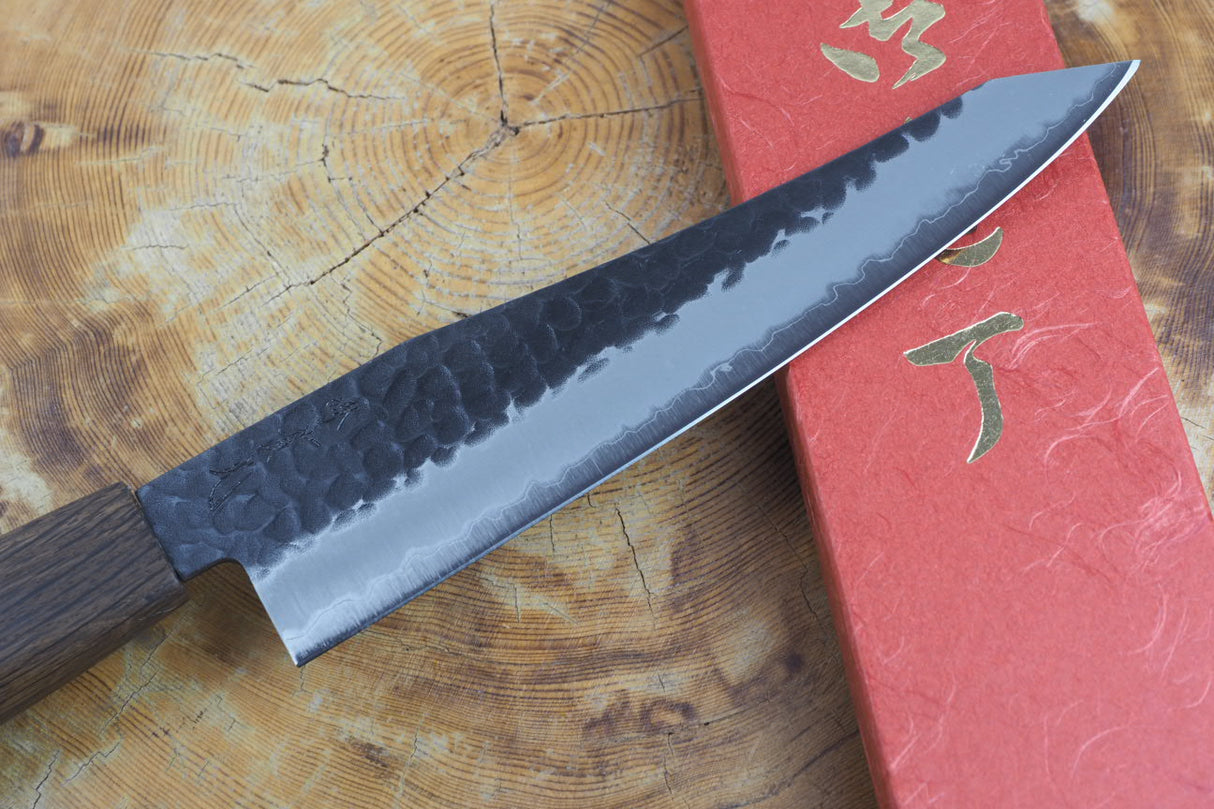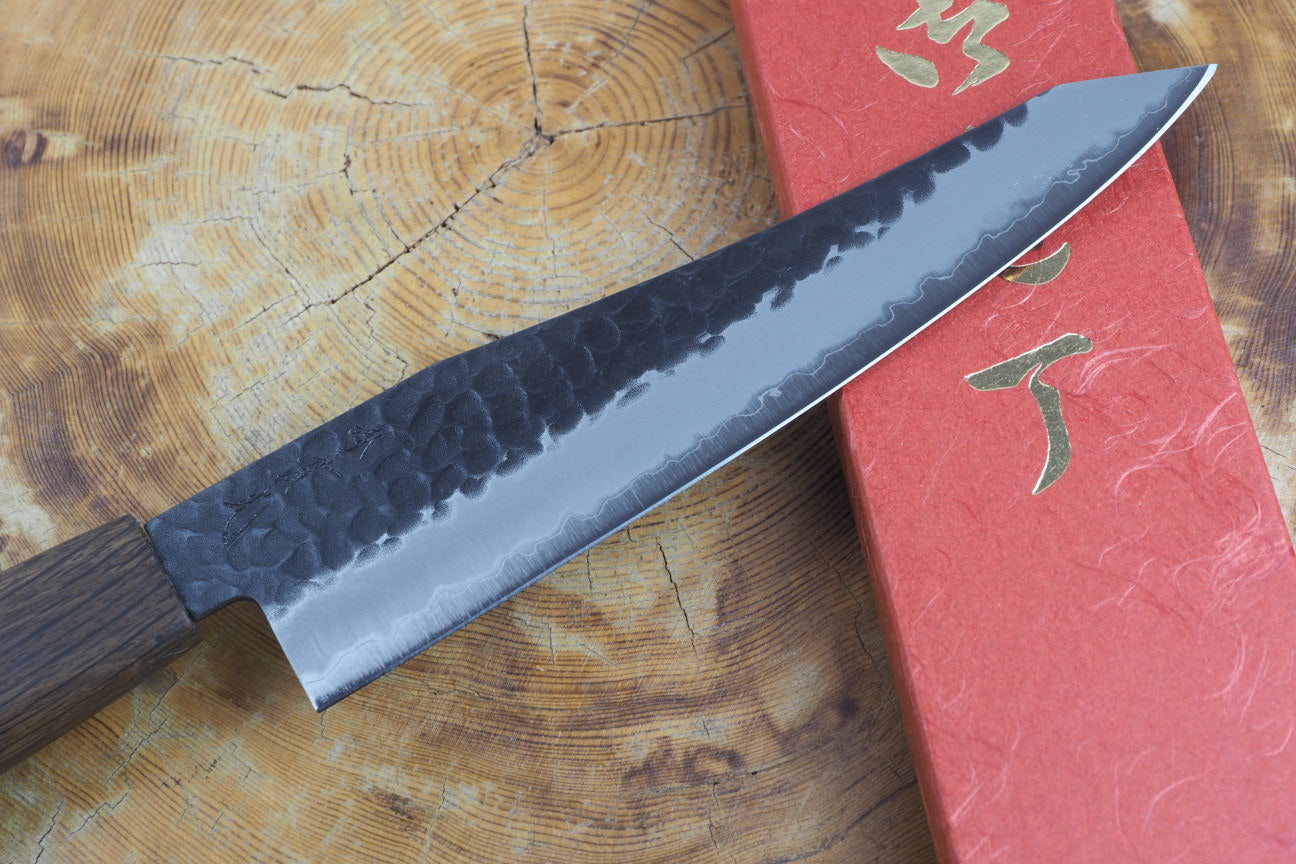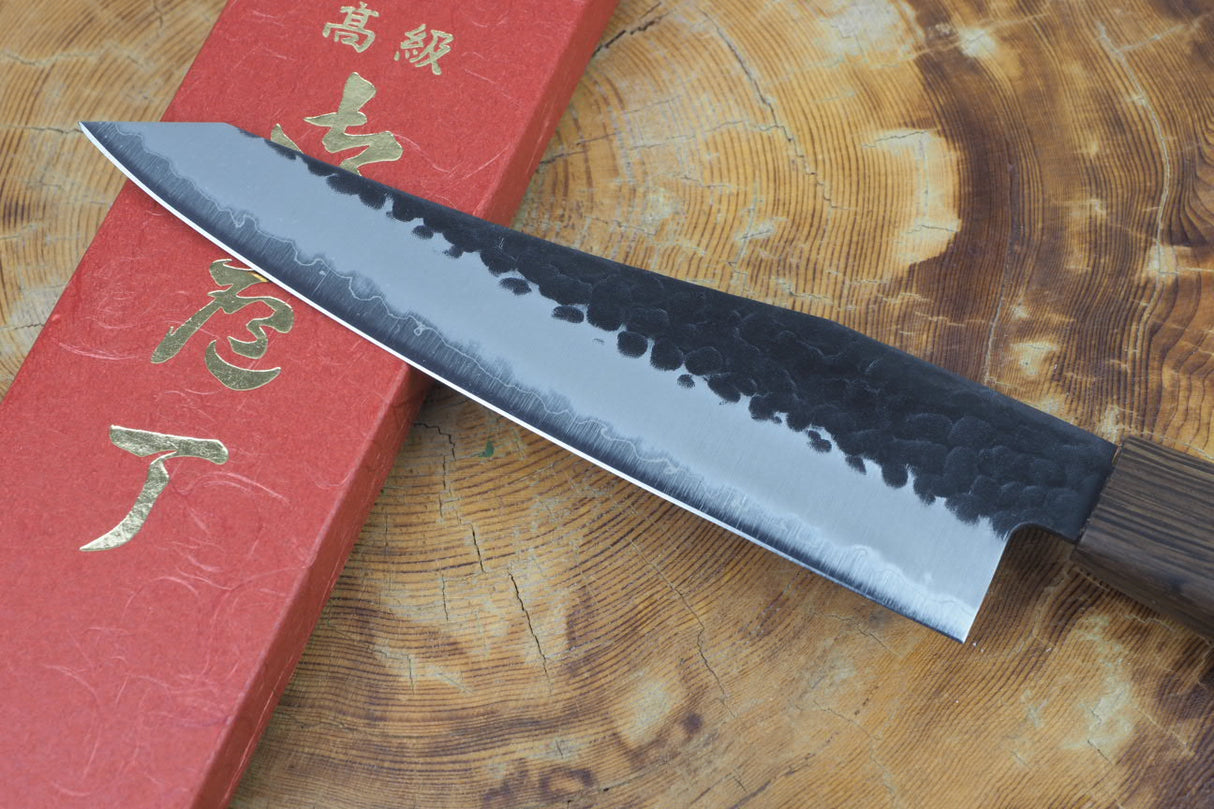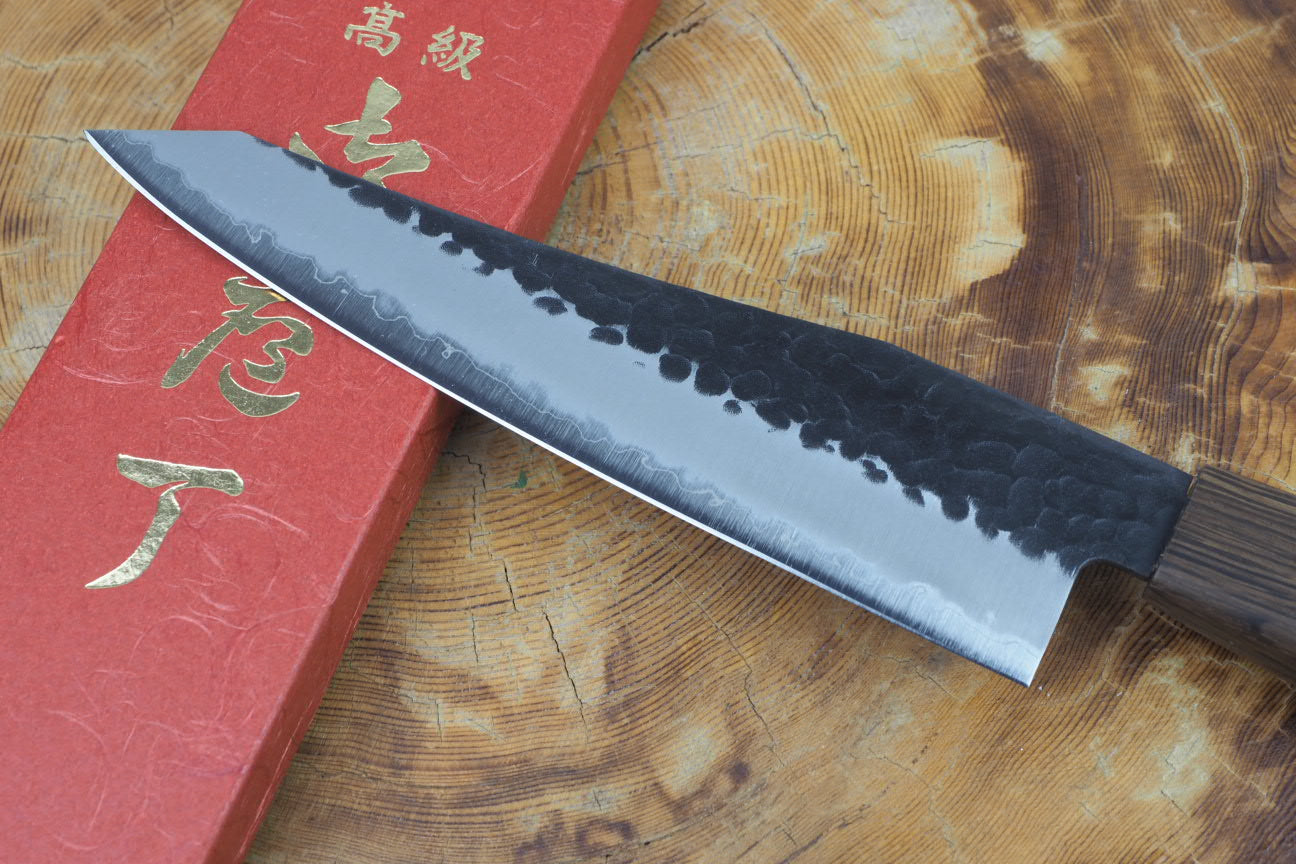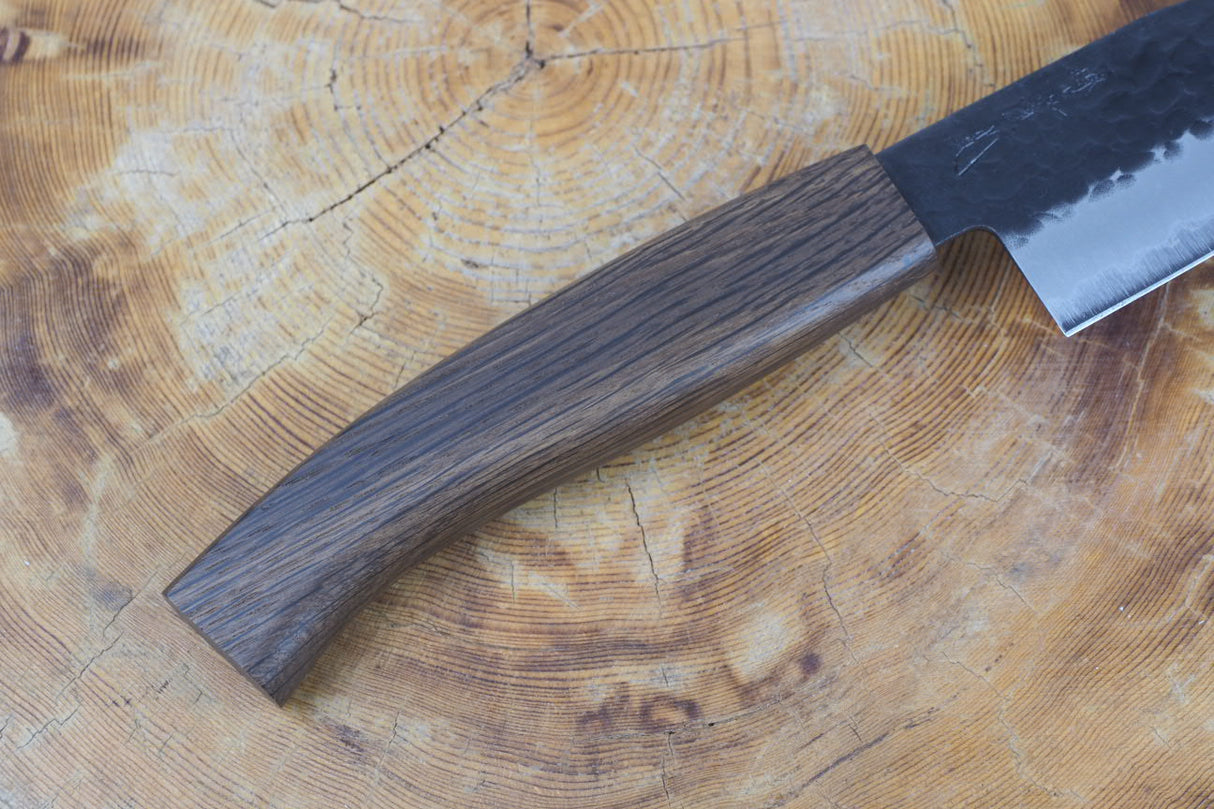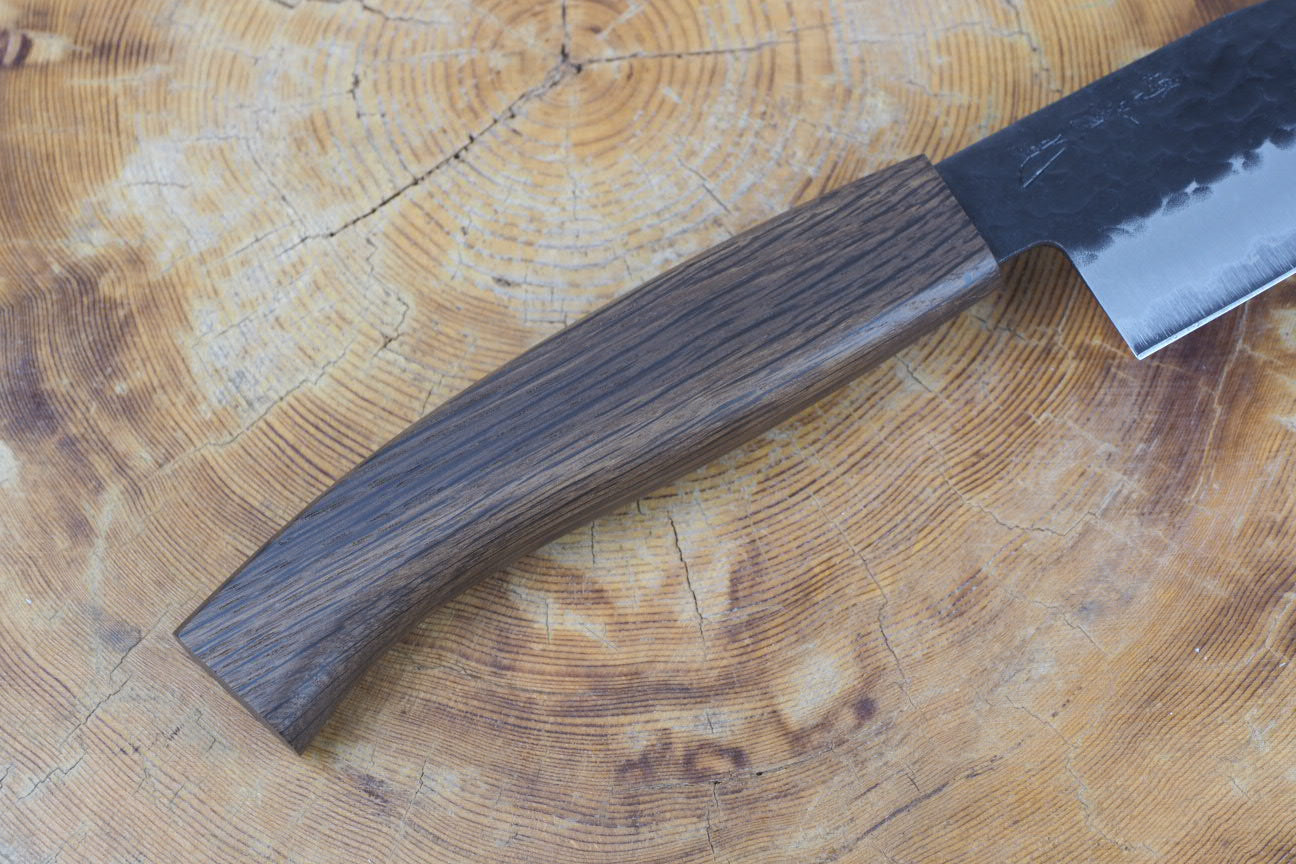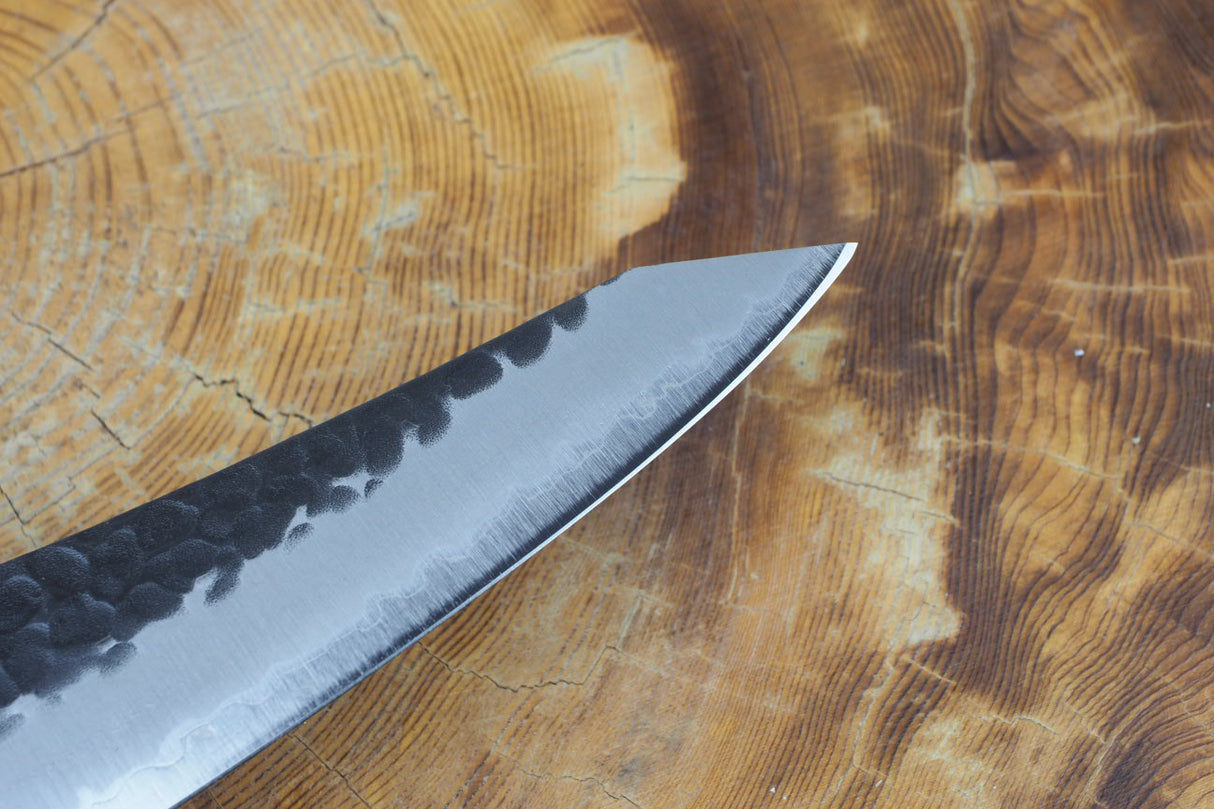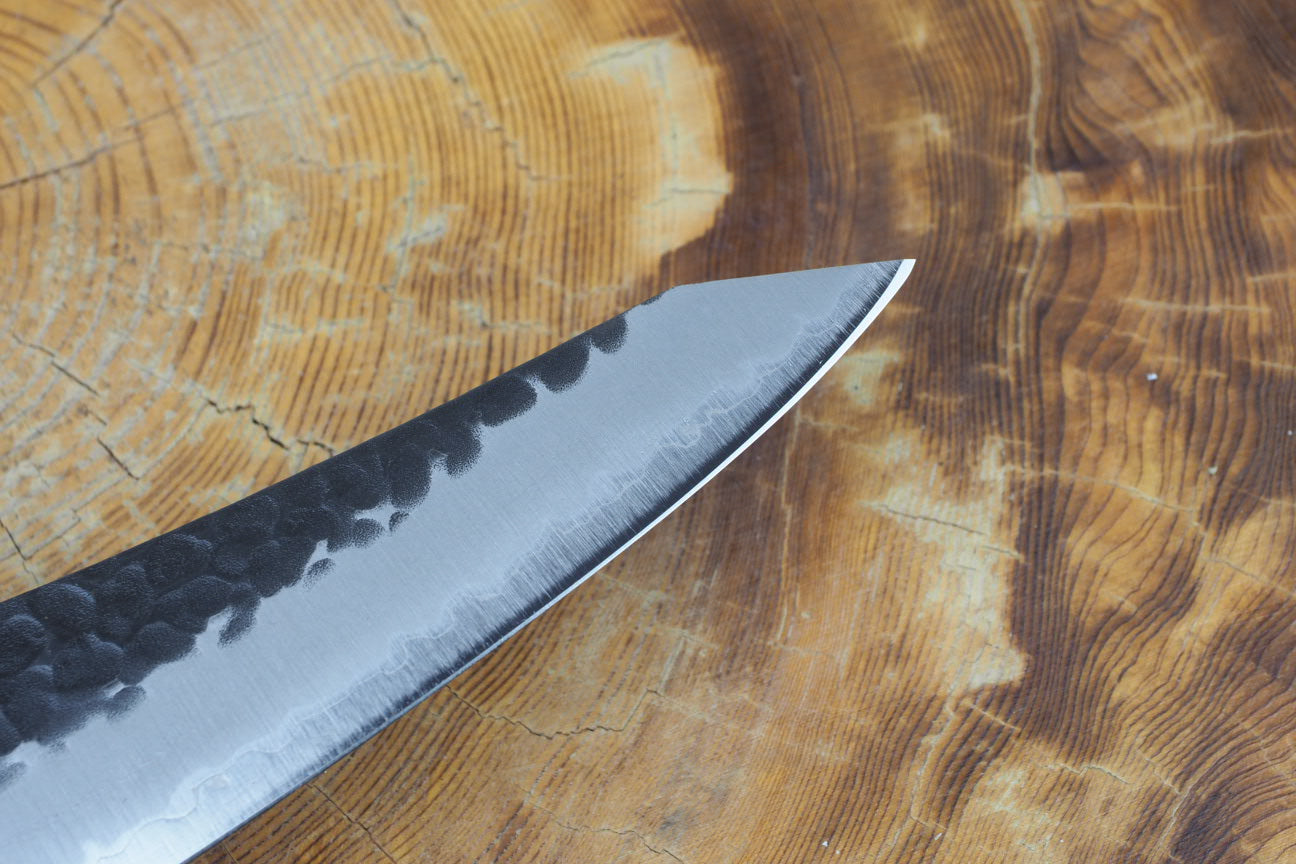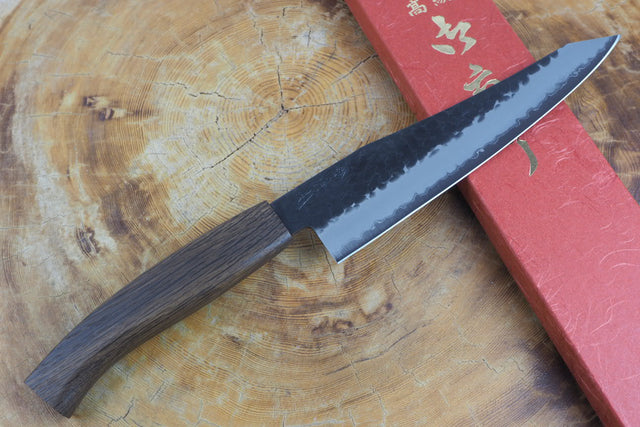Sakai Jikko "Joker" Kurouchi Wa-Petty Knife Blue Super Steel with Hammered Finish (13.5cm)
Couldn't load pickup availability
About Sakai Jikko

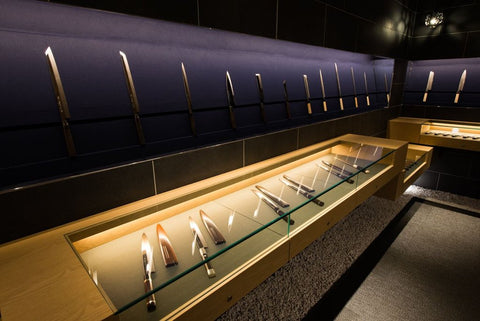
Sakai Jikko is Kaz's signature knife brand. Established in 1901, Jikko has more than 100 years of technology of Japanese knife making.
Their products are preferred by a number of professional chefs because of its superior sharpness and durability. To date, Jikko has made hundreds of thousands of knives and is widely trusted brand in Japan.
About Kurouchi Knives
Kurouchi(黒打)is a type of knives that are only polished the edge line and left with black residue appearing after forging and quenching. The black part of every Kurouchi looks different to each other and shows a little imperfection in their looks. However, this rustic design is aesthetically pleasing to eyes and feels traditional craftsmanship.

Blade: Blue Super Steel (Aogami-Super)

・Blue Super Steel
Sharpness ★★★★★ (5/5)
Hardness/durability ★★★★ ★ (5/5)
Edge retention ★★★★ ★ (5/5)
Ease of sharpening ★★★★☆ (4/5)
Rust resistance ★★★☆☆ (3/5)
Manufactured by Hitachi Metals,Ltd. Contains Carbon 1.4%, Tungsten 1.5%, Manganese 0.25%, Chromium 0.4%, Vanadium 0.4%, Rockwell Hardness 61-65 HRC. Very hard material made from the finest particle pure carbon.
Blue Super Steel (青鋼スーパー)is known for the highest sharpness and durability. Above the level of White Steel, Blue Steel contains smallest impurities as well as additional chrome and tungsten which makes the knives strong to wear and tear. With this mixture, Blue Steel is an ideal material for Japanese cutlery products.
It has a very narrow range of temperatures for hardening (Yakiire and quenching), and thus requires the blacksmith to be very skilled.
| Type of Carbon Steel | HRC reference (the higher, the better in sharpness, edge retention and longer lifetime) | Price reference for general chef's knife 21cm |
| Blue Steel Super | 61-65 | $$$$$ ($800-1500) |
| Blue Steel 1 and 2 | 61-64 | $$$$ ($500-1200) |
| White Steel 1 and 2 | 61-64 | $$$ ($300-800) |
| Standard Japanese SK Steel | 58-60 | $$ ($100-200) |
Suited for both right and left handers as the blade is aligned 50:50.
Handle: Laurel wood
The laurel wood handle gives a mature impression and massive feeling when held in hand. This curvy shape was created in collaboration with a furniture designer, which is meant to give the most stable and comfortable grip.

Each knife comes with an individual knife box, which is good for a storage when not used and is presentable for gift purposes. Use of knife sheath is recommended only when you take the knife outside.
All the knives are pre-sharpened to the optimal result. They are ready for the first cut!
3 Simple Steps to keep your carbon steel knives away from rust and in a good condition.
|
For everyday use you can apply step 1 and 2 only. However if you store the knife for a long period including step 3 is recommended.
Knife for a Good Cause - We donate $2 for every knife sold
Your knife will save someone's life
We started a corporate partnership with Cancer Council Victoria in July 2024. By purchasing knives from us, you will automatically participate in this campaign as we collect $2 from the sales of every knife product. Say if you purchase 2 knives, we donate $4 on behalf of you.
For more information, visit https://kazsknifeonline.com.au/pages/knife-for-a-good-cause
Kaz's Knife "No worries, Minor-Issue Warranty"
Having been used for a while, even good knives can get chipped and rusty as seen in the above video, but don't worry!
Most of the minor issues can be fixed by sharpening on a #400-#1000 whetstone. We have tutorial videos for you to learn how to use whetstone. However, it might seem a bit hard work to get it done by yourself.
Kaz's knife is offering "Minor-issue warranty" which covers small chips and rust on the knives you purchased from us. You can always contact us when you feel your knife became dull, chipped, rusty, etc. We fix those minor issues and send the sharpened knife back to you, mostly for free of charge! (depending on how much work is required, also you bear the postage for sending the knife to us)
(*) Please be advised, we do not warrant major issues caused by misuses such as dropped, cutting bones or frozen food, putting too much force into hard materials, etc.
About delivery
We ship products from Melbourne with Australia Post. Delivery for stocked items takes 1-4 business days depending on your location. Please allow extra 2-3 business days for an international delivery.
Free shipping applies above $250 orders.
Return policy
Our policy lasts 7 days. If 7 days have gone by since your purchase, unfortunately we can’t offer you a refund or exchange.
To be eligible for a return, your item must be unused and in the same condition that you received it. It must also be in the original packaging.
Three merits to have good, quality kitchen knives
1. Better sharpness
Improving the cut quality of the kitchen knife, we can promise that "your cooking will be more delicious", "your cooking time will be reduced", and "cooking will be more fun".
2. It is easy to re-sharpen
Since quality kitchen knives do not have distortion, sharpening will become easier. Just as important as the cut quality of a kitchen knife is that it is easy to sharpen.
3. It retains its sharpness for longer
If you use quality kitchen knives, you can extend the intervals between when you need to re-sharpen.
Message from Kaz and Harry

"Good knife will change your life"
The best shortcut to improving your cooking is to change to a good sharp kitchen knife.
If the knife cuts well, the ingredients will taste delicious. And a delicious dish puts a smile on the face of the people who eat it.
We want you to make life itself more fun by changing your kitchen knife. Let us guide you to choose the good knife to change your life.
-
my_fields.specification
Payment & Security
Payment methods
Your payment information is processed securely. We do not store credit card details nor have access to your credit card information.
Frequently Asked Questions
Shipping
What countries do you ship to?
What countries do you ship to?
We ship orders from Melbourne. As well as everywhere within Australia, we ship to United States, Canada, New Zealand and some European countries. If your area is not listed in the checkout, please let us know.
How long will it take to receive my order?
How long will it take to receive my order?
Shipping timeframe depends on Australia Post. Parcel post shipping normally takes 1-4 days while express post shipping ensures more prompt delivery. International shipping times depend on the destination (estimated at checkout).
Do you bear import tariffs?
Do you bear import tariffs?
No, import tariff and any fees accompanying have to be paid by customers.
Returns and Refunds
How do I return a product?
How do I return a product?
First if all, please contact us by email: info@kazsknifeonline.com.au.
Items must be returned within 30 days after receiving your order. Items must be returned in the same condition in which they were received, be unused, including all the original packaging.
Upon items returned and confirmed to be resalable, we will process a refund for the item.
How long will it take to receive my refund?
How long will it take to receive my refund?
It usually takes 3-5 business days from the time we process the refund until you receive the money.

